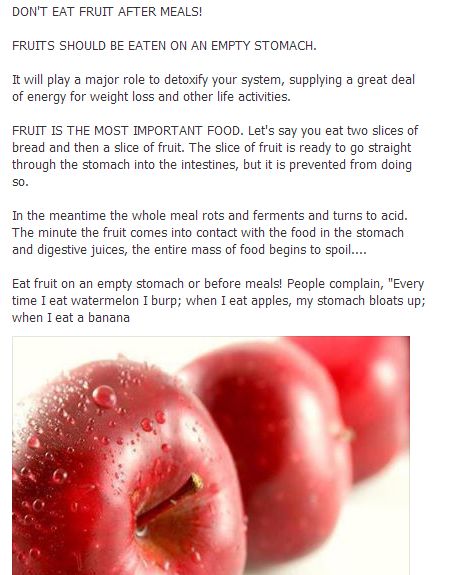MYTH: DON'T EAT FRUIT AFTER A MEAL!
MYTH: DON'T EAT FRUIT AFTER A MEAL!
QUESTION from Patient : I read on the internet that it's best to not have fruit after a meal, is this true?

ANSWER from Registered Dietitian, Deborah A. Klein, MS, RD:
Thank you for submitting your question. As a Registered Dietitian for 15 years with a Master's of Science in Foods and Nutrition, you are welcome to eat fruit after a meal that contains protein and very little carbohydrate to fit in the carbohydrate from fruit. It's best to eat fruit that is high in fiber, I call it "S and S fruits" (edible skin and edible seeds) fruit for more satisfaction and a slower digestion, fiber slows the absorption of the sugar in the fruit, helping you feel fuller longer. Carbohydrate foods including fruit, starch and dairy (milk and yogurt) are digested more quickly than protein. That's why I recommend eating fruit or any other high fiber carb (yams, whole grains, artichokes, etc.) with a dietary protein (which takes 4 to 5 hours to digest) to help you feel more sustained after eating (about 4 to 5 hours of sustainability). It's best to eat within an hour and half after waking and every 4 to 5 hours max throughout the day. Give yourself an hour and a half to 2 hours to digest before you go to sleep.
Every food needs to be digested to be utilized in the body. It's a good thing to have the fruit slowed down in regards to digestion from the fiber and the protein to help you feel fuller longer, it will not be fermented in your body, it will be utilized. Drink lots of water and take probiotics to help your body increase nutrient absorption.
Bottom line: eating a meal with high carbohydrates (pasta, bread or starchy vegetables) and then having fruit after that, I do not recommend, because that is overloading in calories which is not helpful for keeping a lean body and preventing disease. The whole concept of not eating fruit after a meal does help prevent overload. I do not recommend eating as much fruit as you want, since it does contain carbohydrate calories (1/2 cup fruit = 15 grams or carbs and 60 calories), excess fructose is excess calories (increasing body fat), excess fructose also increases LDL (bad cholesterol) (increasing risk for heart disease), and overworks the pancreas, stimulating excess insulin production, which increases risk for diabetes.
